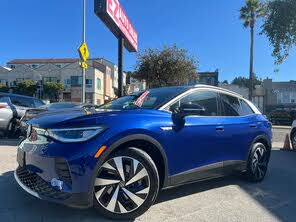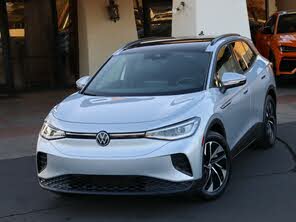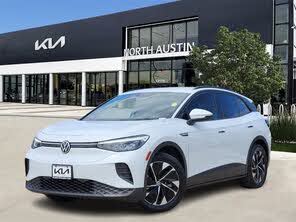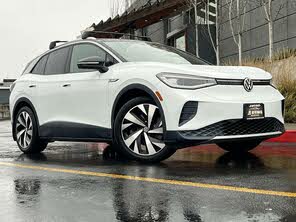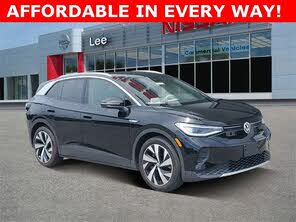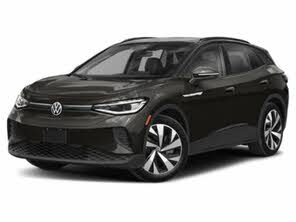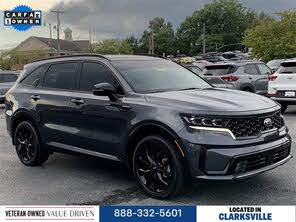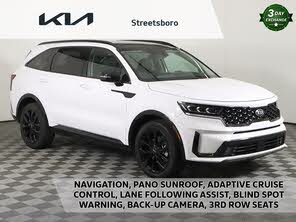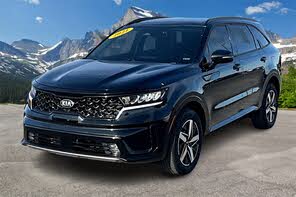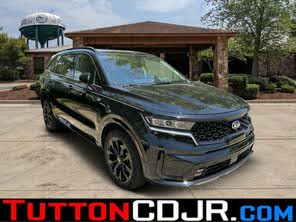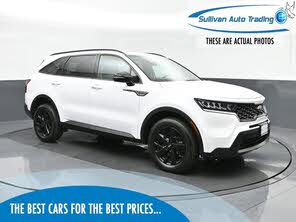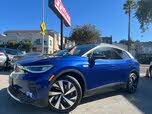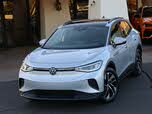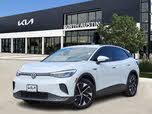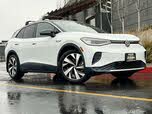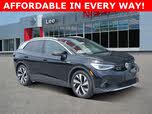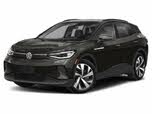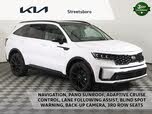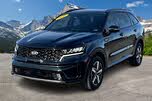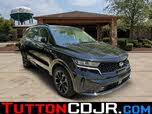2021 Volkswagen ID.4 vs 2021 Kia Sorento
Overview | |
MSRP$29,390 | MSRP$39,995 |
Average price$25,341 | Average price$23,315 |
Listings855 | Listings218 |
Ratings & Reviews | |
User Reviews | User Reviews |
Expert reviews7.7 out of 10 | Expert reviews7.3 out of 10 |
Pros
| Pros
|
2021 Kia Sorento Reviews SummaryAfter striking gold with the Telluride, Kia has doubled down on the three-row SUV segment with the redesigned Sorento. While it might not bring the same level of near-luxury refinement that has made the Telluride a smash hit, the slightly smaller Sorento arrives as a compelling option for those who value a more maneuverable family crossover. | |
2021 Volkswagen ID.4 Reviews SummaryThe “Dieselgate” emissions scandal forced Volkswagen to double down on electric cars, and now we’re finally seeing the first result of that: the 2021 Volkswagen ID.4 electric crossover. VW has made an electric car before, but its last attempt, the e-Golf, was built to satisfy emissions standards, not rack up sales. It was barely advertised, and it was sold only in certain states. That’s not the case with the ID.4, which will be available nationwide and will even be built in Tennessee starting in 2022. Volkswagen views the ID.4 as a rival not to other EVs, but to mainstream gasoline vehicles like the Honda CR-V and Toyota RAV4. Being late to the party means there are already several other EVs trying to coax new-car buyers away from internal combustion, however. If you want a reasonably-priced EV, the Nissan Leaf, Hyundai Kona Electric, and Kia Niro EV already exist, and General Motors just announced the 2022 Chevrolet Bolt EUV—a new variant of the Chevy Bolt EV with a crossover body style similar to the Volkswagen. We tested an ID.4 1st Edition, which commemorates the car’s launch, and an ID.4 PRO S with all-wheel drive (AWD). The 1st Edition is a limited-edition model that has already sold out, but it’s mechanically identical to the ID.4 Pro S AWD, albeit with power sent only to the rear wheels. | |
Popular Features & Specs | |
Engine2.5L 191 hp I4 | Engine201 hp Electric |
Drive TrainFWD | Drive TrainRWD |
Seating Capacity7 | Seating Capacity5 |
Horsepower191 hp @ 6100 rpm | Horsepower |
EV Battery Capacity | EV Battery Capacity82 kWh |
MPG City24 | MPG City104 |
MPG Highway29 | MPG Highway89 |
Battery Charge Time (240V) | Battery Charge Time (240V)8 hours |
Engine | |
Engine Name2.5L 191 hp I4 | Engine Name201 hp Electric |
Torque181 lb-ft @ 4000 rpm | Torque |
Horsepower191 hp @ 6100 rpm | Horsepower |
Battery Charge Time (240V) | Battery Charge Time (240V)8 hours |
DrivetrainFWD | DrivetrainRWD |
Fuel Economy | |
EV Battery Capacity | EV Battery Capacity82 kWh |
MPG City24 | MPG City104 |
MPG Highway29 | MPG Highway89 |
Interior | |
Seating Capacity7 | Seating Capacity5 |
Safety | |
Front Crash Overall4 | Front Crash Overall5 |
Side Crash Overall5 | Side Crash Overall5 |
Dimensions & Capacity | |
Cargo Space12.6 cu ft | Cargo Space30.3 cu ft |
Curb Weight3714 lbs | Curb Weight4517 lbs |
Height66.7 in | Height64.4 in |
Length189.0 in | Length180.5 in |
Width74.8 in | Width72.9 in |
Wheelbase110.8 in | Wheelbase108.9 in |
Maximum Payload1643 lbs | Maximum Payload1347 lbs |
Number of doors4 | Number of doors4 |
Maximum Towing Capacity2000 lbs | Maximum Towing Capacity |
Overview | ||
MSRP | $29,390 | $39,995 |
Average price | $25,341 | $23,315 |
Listings | ||
Ratings & Reviews | ||
User reviews | ||
Expert reviews | 7.7 out of 10Read full review | 7.3 out of 10Read full review |
Pros & cons | Pros
| Pros
|
Summary | After striking gold with the Telluride, Kia has doubled down on the three-row SUV segment with the redesigned Sorento. While it might not bring the same level of near-luxury refinement that has made the Telluride a smash hit, the slightly smaller Sorento arrives as a compelling option for those who value a more maneuverable family crossover. | The “Dieselgate” emissions scandal forced Volkswagen to double down on electric cars, and now we’re finally seeing the first result of that: the 2021 Volkswagen ID.4 electric crossover. VW has made an electric car before, but its last attempt, the e-Golf, was built to satisfy emissions standards, not rack up sales. It was barely advertised, and it was sold only in certain states. That’s not the case with the ID.4, which will be available nationwide and will even be built in Tennessee starting in 2022. Volkswagen views the ID.4 as a rival not to other EVs, but to mainstream gasoline vehicles like the Honda CR-V and Toyota RAV4. Being late to the party means there are already several other EVs trying to coax new-car buyers away from internal combustion, however. If you want a reasonably-priced EV, the Nissan Leaf, Hyundai Kona Electric, and Kia Niro EV already exist, and General Motors just announced the 2022 Chevrolet Bolt EUV—a new variant of the Chevy Bolt EV with a crossover body style similar to the Volkswagen. We tested an ID.4 1st Edition, which commemorates the car’s launch, and an ID.4 PRO S with all-wheel drive (AWD). The 1st Edition is a limited-edition model that has already sold out, but it’s mechanically identical to the ID.4 Pro S AWD, albeit with power sent only to the rear wheels. |
Video | ||
Popular Features & Specs | ||
Engine | 2.5L 191 hp I4 | 201 hp Electric |
Drive Train | FWD | RWD |
Seating Capacity | 7 | 5 |
Horsepower | 191 hp @ 6100 rpm | |
EV Battery Capacity | 82 kWh | |
MPG City | 24 | 104 |
MPG Highway | 29 | 89 |
Battery Charge Time (240V) | 8 hours | |
Engine | ||
Engine Name | 2.5L 191 hp I4 | 201 hp Electric |
Torque | 181 lb-ft @ 4000 rpm | |
Horsepower | 191 hp @ 6100 rpm | |
Battery Charge Time (240V) | 8 hours | |
Drivetrain | FWD | RWD |
Fuel Economy | ||
EV Battery Capacity | 82 kWh | |
MPG City | 24 | 104 |
MPG Highway | 29 | 89 |
Interior | ||
Seating Capacity | 7 | 5 |
Safety | ||
Front Crash Overall | 4 | 5 |
Side Crash Overall | 5 | 5 |
Dimensions & Capacity | ||
Cargo Space | 12.6 cu ft | 30.3 cu ft |
Curb Weight | 3714 lbs | 4517 lbs |
Height | 66.7 in | 64.4 in |
Length | 189.0 in | 180.5 in |
Width | 74.8 in | 72.9 in |
Wheelbase | 110.8 in | 108.9 in |
Maximum Payload | 1643 lbs | 1347 lbs |
Number of doors | 4 | 4 |
Maximum Towing Capacity | 2000 lbs | |
The 2021 Kia Sorento marked a significant departure from its previous generation's jelly-bean-inspired styling, embracing a more athletic and muscular silhouette. The SX Prestige trim with the X-Line package featured roof rails, a shark fin antenna, and a rear roof spoiler, enhancing its rugged appeal. The front showcased an expansive tiger-nose grille with a noticeable curve, complemented by squinting headlights and running lights. A silver accent between the front fender and the door added a touch of sophistication. The rear design included large D-pillars and beautiful vertical taillights, giving the Sorento a cautiously modern look that seemed poised to age gracefully.
Inside, the Sorento was packed with high-value features. Heated outside mirrors, second-row air vents, Apple CarPlay, Android Auto, Bluetooth connectivity, and keyless entry were standard across the lineup. The base LX trim offered six-way driver’s seat adjustment, while higher trims provided 10-way adjustment with power lumbar support. Heated seats were available on all but the LX trim, and the SX Prestige with the X-Line package included ventilated seats. The panoramic sunroof and large windows ensured excellent visibility, although the sunroof sometimes let in too much sunlight during long road trips.
The 2021 Volkswagen ID.4, designed from the ground up as an EV, showcased a distinctive look that set it apart from Volkswagen’s gasoline models. It featured a streamlined profile with wheels pushed out to the corners, eschewing the fake toughness of the Tiguan and Atlas crossovers. The ID.4 was based on VW’s EV-specific MEB platform, following the European-market ID.3 hatchback. While it didn’t look much like an SUV, it shared this trait with many other EV crossovers, such as the Chevy Bolt EUV and Hyundai Kona Electric.
Inside, the ID.4 blended Volkswagen’s trademark minimalism with a smartphone aesthetic. The base ID.4 Pro came with a leather-wrapped steering wheel and cloth seats, while the Pro S and 1st Edition models featured leatherette upholstery. The interior design emphasized tech, with piano black and matte plastic elements. Despite the lack of a “frunk,” the cabin felt spacious, and forward visibility was good. However, rearward visibility was compromised by thick rear pillars and a small back window. The twist-grip gear selector on the dashboard freed up space on the center console, although the console itself was narrow and close to the floor.
The 2021 Kia Sorento offered a range of small powertrains. The most common was the naturally aspirated 2.5-liter four-cylinder engine, producing 191 horsepower and 181 lb-ft of torque, paired with an eight-speed automatic transmission. However, our test car featured the turbocharged 2.5-liter four-cylinder engine, delivering 281 horsepower and 311 lb-ft of torque through an eight-speed dual-clutch transmission (DCT) with a wet clutch to all-wheel drive (AWD). This setup provided ample power for merging, cruising, and passing on the interstate.
The Sorento also had a hybrid version with a turbocharged 1.6-liter four-cylinder engine and an electric motor, available only with front-wheel drive (FWD). The AWD system in our test car included torque vectoring and a center-locking differential for slippery conditions. The X-Line package added 1.3 inches of ride height, 20-inch alloy wheels, and a roof rack. The suspension, consisting of McPherson struts up front and a multi-link setup in the rear, ensured a smooth and comfortable ride. The various drive modes, including Eco, Normal, and Sport, made a noticeable difference in throttle response and overall driving experience.
The 2021 Volkswagen ID.4 launched with a single rear-mounted electric motor, producing 201 horsepower and 229 lb-ft of torque, powered by an 82-kilowatt-hour battery pack. This made it the first rear-wheel drive (RWD) Volkswagen passenger car sold in the United States since the Beetle. An all-wheel-drive (AWD) version, with a second electric motor powering the front wheels, arrived later in 2021, increasing power output to 295 horsepower and 339 lb-ft of torque.
The RWD setup provided balanced handling, with the front wheels steering and the rear wheels driving. The electric motor’s instantaneous torque made acceleration from stoplights enjoyable. The AWD version offered more power and better traction, performing well on twisty roads despite some body roll. Unlike many electric cars, the ID.4 did not emphasize regenerative braking, relying more on friction brakes for a familiar driving experience. The “B” mode added some regen but did not allow for one-pedal driving.
The 2021 Kia Sorento, a three-row SUV, was best considered a four-seater in its top trims due to the second-row captain's chairs and a tight third row. The cargo space behind the third row was limited to 12.6 cubic feet, making it more practical to fold those seats down. The second-row captain's chairs were comfortable, and the front and rear seats offered ample legroom at 41.4 inches and 41.7 inches, respectively. The Sorento provided various storage options, including a spot for a phone, cupholders, and a decent-sized center console bucket. Total cargo volume was 75.5 cubic feet, comparable to compact crossovers like the Honda CR-V and Toyota RAV4.
The 2021 Volkswagen ID.4 felt spacious compared to other EVs but not as roomy as gasoline crossovers like the Honda CR-V and Toyota RAV4. It offered more front headroom than its gasoline counterparts but had average legroom for the segment. The ID.4 provided 30.3 cubic feet of cargo space with the rear seats in place and 64.2 cubic feet with the rear seats folded. Despite the lack of a “frunk,” the cabin felt spacious, and forward visibility was good. However, rearward visibility was compromised by thick rear pillars and a small back window. The twist-grip gear selector on the dashboard freed up space on the center console, although the console itself was narrow and close to the floor.
The 2021 Kia Sorento featured an 8-inch touchscreen display on the LX, S, and EX trims, with hard buttons, a volume knob, and a tuning knob. The larger 10.25-inch screen on the SX and SX Prestige trims used haptic touch buttons and retained the knobs. However, the larger screen required a physical connection for Apple CarPlay and Android Auto, and the right third of the screen displayed redundant information. The Sorento had plenty of USB ports but no USB-C ports. The optional Bose stereo system was decent but not exceptional. The navigation system needed improvement, particularly in voice search and Point-of-Interest functions.
The 2021 Volkswagen ID.4 came with a standard 10-inch touchscreen (a 12-inch screen was optional) with wireless Apple CarPlay and Android Auto. A 5.3-inch display screen served as the instrument cluster, and haptic touchpads replaced nearly all switchgear. While the setup looked cool, it was difficult to use due to the lack of tactile feedback. The control setup required relearning simple tasks, and the natural-language voice-control system was slow to respond. The ID.Light feature, a light strip at the base of the windshield, communicated information to the driver but was mostly a gimmick. However, the touchscreen was well-positioned, with smart-looking graphics and easy-to-navigate menus.
The 2021 Kia Sorento came equipped with a comprehensive array of standard safety features, including automatic emergency braking with pedestrian detection, a driver-attention warning, lane-keeping assist, lane-departure warning, lane-following assist, and auto high beams. Our test car also had a surround-view camera and adaptive cruise control, which worked smoothly. The lane-keeping assist system occasionally made excessive corrections. The Sorento received four out of five stars overall from the National Highway Traffic Safety Administration (NHTSA) and a Top Safety Pick designation from the Insurance Institute for Highway Safety (IIHS).
The 2021 Volkswagen ID.4 received the highest-level Top Safety Pick+ designation from the IIHS and five out of five stars from the NHTSA for the RWD version. The standard safety features included forward-collision warning, automatic emergency braking, blind-spot monitoring, lane-keep assist, park distance control, automatic high beams, and adaptive cruise control. The ID.4 also introduced Travel Assist, which added automated lane centering to the adaptive cruise control, and Emergency Assist, designed to stop the car if the driver is incapacitated. Travel Assist performed well, smoothly following curves and responding well to acceleration and deceleration.
CarGurus highlights

According to CarGurus experts, the overall rating for the 2021 Kia Sorento is 7.7 out of 10, while the 2021 Volkswagen ID.4 scores 7.3 out of 10. Based on these ratings, the 2021 Kia Sorento is the better choice, offering a more versatile powertrain lineup, superior interior comfort, and a comprehensive suite of safety features.
Choose the 2021 Volkswagen ID.4 if:
- You are looking for an all-electric vehicle with a distinctive design and spacious interior.
- You value advanced technology features, such as wireless Apple CarPlay and Android Auto, and a well-positioned touchscreen.
- You prioritize safety, with top ratings from both the IIHS and NHTSA, and advanced driver-assistance features like Travel Assist.
Choose the 2021 Kia Sorento if:
- You need a versatile SUV with a range of powertrain options, including a turbocharged engine and hybrid variant.
- You prioritize interior comfort and high-value features, such as heated seats and a panoramic sunroof.
- You want a vehicle with strong safety ratings and a comprehensive suite of standard safety features.
CarGurus highlights

According to CarGurus experts, the overall rating for the 2021 Kia Sorento is 7.7 out of 10, while the 2021 Volkswagen ID.4 scores 7.3 out of 10. Based on these ratings, the 2021 Kia Sorento is the better choice, offering a more versatile powertrain lineup, superior interior comfort, and a comprehensive suite of safety features.
Choose the 2021 Volkswagen ID.4 if:
Shop Now- You are looking for an all-electric vehicle with a distinctive design and spacious interior.
- You value advanced technology features, such as wireless Apple CarPlay and Android Auto, and a well-positioned touchscreen.
- You prioritize safety, with top ratings from both the IIHS and NHTSA, and advanced driver-assistance features like Travel Assist.
Choose the 2021 Kia Sorento if:
Shop Now- You need a versatile SUV with a range of powertrain options, including a turbocharged engine and hybrid variant.
- You prioritize interior comfort and high-value features, such as heated seats and a panoramic sunroof.
- You want a vehicle with strong safety ratings and a comprehensive suite of standard safety features.

By: CarGurus + AI
At CarGurus, our team of experienced automotive writers remain at the heart of our content operation, conducting hands-on car tests and writing insightful guides that are backed by years of industry experience. To complement this, we are harnessing AI to make our content offering more diverse and more helpful to shoppers than ever. To achieve this, our AI systems are based exclusively on CarGurus content, ratings and data, so that what we produce is both unique to CarGurus, and uniquely helpful to car shoppers.





















